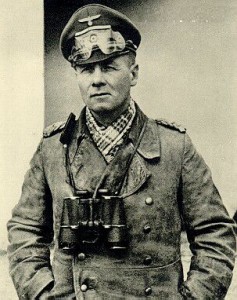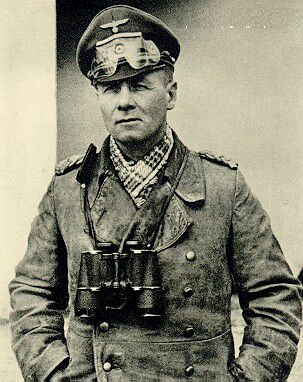
Rommel was born in 1891 in Wurttenberg, Germany, the son of a teacher. Although not descended from military men, the newly unified German empire made it fashionable to choose a military career, which young Rommel did, becoming an officer cadet. During World War I, he showed himself to be a natural leader with unnatural courage, fighting in France, Romania, and Italy. Following the war, he pursued a teaching career in German military academies, writing a textbook, Infantry Attacks, that was well regarded.
At the outbreak of World War II, Rommel was given command of the troops that guarded Hitler’s headquarters, a disappointment for a man used to fighting on the front lines with the infantry. But in early 1940, he was given his chance to put to use his gifts, when he was given command of the 7th Panzer Division. Although a novice as far as mechanized forces were concerned, he soon mastered the advantages and proved his leadership abilities again in the German offensive against the French channel coast in May.
In early 1941, Rommel was given control of the troops sent to North Africa to aid Germany’s ailing ally, Italy, in maintaining its position in Libya. It is here, in the deserts of North Africa, that Rommel earned his vaunted reputation, as well as his nickname (he became known for his “fox-like” sneak attacks). Winning significant victories against the British, whom he begrudgingly admired, Rommel nevertheless became weary of this theater of operations; he wanted to go back to Europe. It wasn’t until a second battle to take el-Alamein in Egypt went against him that the “invincible” general was finally called home back to Europe.
Hitler put Rommel back in northern France, to guard against an Allied invasion. Rommel’s suggestions for the precautions necessary to repel an enemy invasion were not heeded, and he began to lose confidence in Hitler and Germany’s ability to win the war. When Rommel was approached by friends to agree to head the German government in the event of Hitler’s overthrow, he agreed-although there was no explicit talk of assassination, which he found abhorrent.
D-Day was launched, and Rommel’s prediction of disaster for Germany’s position played itself out. Still, Hitler would not consider negotiations with the Allies. Rommel ended up in the hospital after his car was attacked by British bombers and he was forced off the road. Meanwhile, details of the failed assassination plot had come to Hitler’s attention, including Rommel’s contact with the conspirators. As Rommel was convalescing in his home at Herrlingen, two generals visited and offered him his choice-trial or suicide. Rommel told his wife and son what had transpired, and that he had chosen to take the cyanide capsules the generals had provided.
The German government gave Rommel a state funeral. His death was attributed to war wounds.


